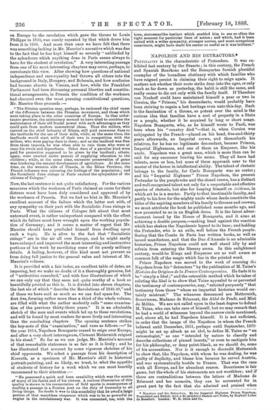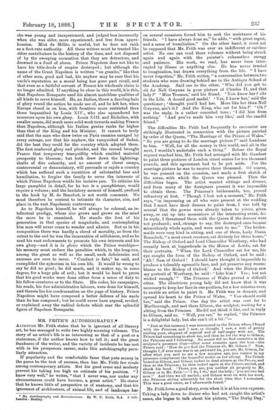NAPOLEON AND HIS DETRACTORS.*
PERTINACITY is the characteristic of Pretenders. It was ex- hibited last century by the Stuarts ; in this century, the French and Spanish Bourbons and the Bonapartes furnish plentiful examples of the boundless obstinacy with which families who have reigned persist in claiming their right to reign again. It matters not whether their roots strike deep into the ages, or only reach as far down as yesterday, the habit is still the same, and really seems to die out only with the family itself. If Theodore von Nenhoff could have maintained himself a year or two in Corsica, the " Princes," his descendants, would probably have been striving to regain a lost heritage even unto this day. Such is the fascination of a throne, so potent over the mind is the curious idea that families have a sort of property in a State or a people, whether it be acquired by long or short usage. Napoleon Bonaparte, who, as he himself wrote to Paoli, was born when his " country died "—that is, when Corsica was subjugated by the French—placed on his head, five-and-thirty years afterwards, an Imperial crown, and thenceforth his relatives, for he has no legitimate descendant, became Princes, Imperial Highnesses, and one of them an Emperor, like his uncle. Napoleon was a great man, which is more than can be said for any successor bearing his name. They all have had talents, more or less, but none of them approach near to the master of the house in intellectual ability. The talent of rhetoric belongs to the family, for Carlo Bonaparte was an orator; and his "Imperial Highness" Prince Napoleon, the present Pretender to the purple robe and the closed crown, has a distinct and well-recognised talent not only for a respectable and effective species of rhetoric, but also for keeping himself en evidence, in which art he is a master. Partly to that inestimable faculty, and partly to his love for the mighty uncle whose deeds constitute the titles of the aspiring members of his family to thrones and crowns, we must attribute the book he published some months ago, and now presented to us in an English dress. It is the latest adver- tisement issued by the House of Bonaparte, and it aims at achieving a double purpose,—making head against the reaction which has shaken the Napoleonic legend to its base ; and holding the Pretender, who is an exile, well before the French people. Seeing that the Comte de Paris has written books, as well as issued manifestoes, and that the Dim d'Anmale is an admirable historian, Prince Napoleon could not well stand idly by and refrain from entering the literary arena. In this enlightened century, would-be Kings and Emperors are as well aware as common folk of the magic which lies in the printed word.
Prince Napoleon was moved to the work of rescuing as Napoleon from his " detractors " by the publication of M. Taine's Histoire dee Origines de la France Oontemporaine. He finds it to be " simply a libel ;" and the ostensible method which he takes of refuting the libel is to show that Taine appealed to or perverted the testimony of contemporaries, nay, " selected purposely " that testimony from those " whom an impartial historian would cer- tainly mistrust." The witnesses denounced are Metternich, Bourrienne, Madame de Remusat, the Abb6 de Pradt, and Miot de Mdlito. We are not called upon in the least degree to defend M. Taine, who can take care of himself, but we may remark that he had a world of witnesses beyond the narrow circle mentioned, and, above all, he had Napoleon himself. It is not sufficient, in order that the image of the Napoleon in whom the French believed until December, 1851, perhaps until September, 1870- might be set up afresh as an idol, to define M. Taine as "an entomologist," as one " intended by nature to classify and describe collections of pinned insects," or even to castigate him for his philosophy, or deny point-blank, as we should do, some of his accusations. Nor is it enough to discredit Metternich to show that, like Napoleon, with whom he was dealing, he was guilty of duplicity, and blame bim because he served Austria, and was systematically hostile to France. That was the case with all Europe, and for abundant reason. Bourrienne is fair game, but the whole of his statements are not worthless ; and if there are contradictions between the letters of Madame de R6musat and her memoirs, they can be accounted for in great part by the fact that she admired and praised when
• Napoleon and his Detractors. By his Imperial Highness Prince Napoleon. Translated and Edited, with a Biographical Sketch and Notes,. by B.2phadl Lodes de Beaufort. London ; W. H. Allen and Co.
she was young and inexperienced, and judged less incorrectly when she was older, more experienced, and free from appre- hension. Idiot de Melito is useful, but he does not rank as a first-rate authority. All these writers must be treated like other contributors to the history of the time, and not disposed of by the sweeping accusation that they are detractors, and drowned in a flood of abuse. Prince Napoleon does not like to have his title-deeds of empire destroyed ; but although the name of the Great Napoleon is written "on granite," like that of other men, good and bad, his nephew may be sure that his uncle's reputation as a moral being has gone past recall, and that even as a faithful servant of France his wholesale claim is no longer admitted. If anything be clear in this world, it is this, that Napoleon Bonaparte used his almost matchless qualities of all kinds to serve himself. He, an Italian, threw a dazzling halo of glory round the nation he made use of, and he left her, when Europe closed in on him, with frontiers more restricted than those bequeathed by Louis XIV., who also squandered her resources upon his own glory. Louis XIII. and Richelieu, with smaller means, did much more solid work towards making France than Napoleon, although his Italian genius ranks far higher than that of the King and his Minister. It cannot be truly said that the man who drew twice on Paris enemies enraged by every outrage, nor that his nephew, the vanquished of Sedan, did the best they could for the country which adopted them. The first conferred glory and plunder, and the second brought France that temporary tranquillity which enabled material prosperity to blossom ; but both drew down the lightning- shafts of dire calamity, and no amount of clever essays, controversial or denunciatory, will persuade or cajole a country which has suffered such a repetition of substantial loss and humiliation, to forgive the family to serve the interests of which Prince Napoleon wields his incisive pen. To criticise his large pamphlet in detail, for he too is a pamphleteer, would require a volume ; and the laudatory memoir of himself, prefixed to the book by M. de Beaufort, is not worth comment. We must therefore be content to intimate its character, aim, and place in the vast Napoleonic controversy.
As to Napoleon himself, he will always be colossal, an in- tellectual prodigy, whose size grows and grows on the mind the more he is examined. He stands the first of his generation in that species of magnitude, and contemplating him men will never cease to wonder and admire. But as in his composition there was hardly a shred of morality, as from the outset to the end he was the incarnation of selfishness, and as he used his vast endowments to promote his own interests and his own glory—and it is la gloire which the Prince worships— his memory must endure the penalties which, in the long-run, among the great as well as the small, such deficiencies and excesses are sure to incur. " Conduct is fate," he said, and exemplified the aphorism in his own life. It would be wrong to say he did no good ; he did much, and it makes up, in some degree, for a huge pile of evil ; but it would be hard to prove that his good works were done either from a sense of duty to his fellow-creatures or to the State. His codes, his campaigns, his roads, his fine administrative labours, were done for himself, and therein lies his condemnation on the page of history. Prince Napoleon might have composed a better defence of his uncle than he has composed ; but he could never have argued, reviled, or explained away the radical defects which mar the splendid figure of Napoleon Bonaparte.



































 Previous page
Previous page